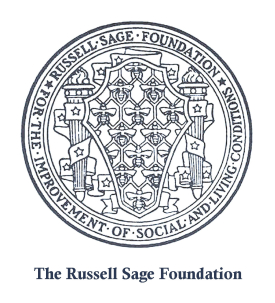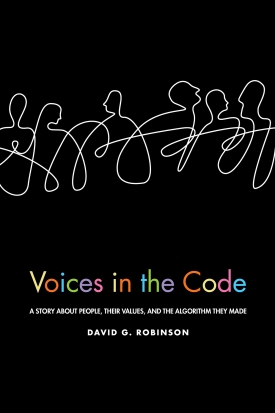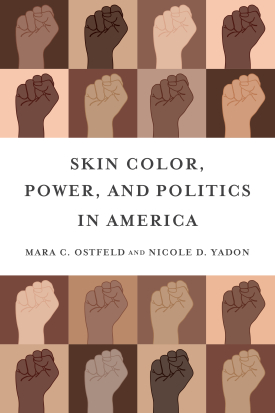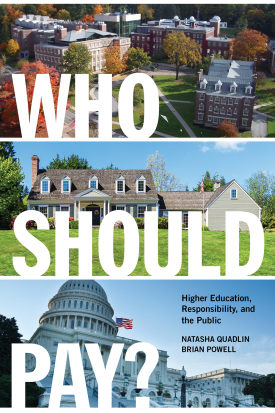
The Use of Standardized Ability Tests in American Secondary Schools and Their Impact on Students, Teachers, and Administrators
About This Book
This report, a collaboration between Project Talent at the University of Pittsburgh and the Russell Sage Foundation, presents the results of a survey of the attitudes of secondary school students, teachers, and counselors toward ability tests and provides an appraisal of the extent of these tests’ use.
RSF Journal
View Book Series
Sign Up For Our Mailing List
Apply For Funding
Almost four billion people use social media platforms, making it increasingly important to understand how social media impacts intergroup conflict and affective polarization, that is, disdain for out-group members. Psychologist Jay Van Bavel will examine which social media platforms are associated with polarization and will test interventions to decrease polarization. His work will advance debates about the ways in which social media contributes to polarization and will offer practical solutions to reduce polarization online.
The increased visibility of the use of force by police officers is due, in part, to individuals recording interactions with police on cellphones. While previous research has shown how police perception of citizens influences police behavior, few studies have focused on citizens’ perceptions of police, particularly on the extent to which citizens view police officers as threatening.

Voices in the Code
About This Book
Algorithms–rules written into software–shape key moments in our lives: from who gets hired or admitted to a top public school, to who should go to jail or receive scarce public benefits. Today, high stakes software is rarely open to scrutiny, but its code navigates moral questions: Which of a person’s traits are fair to consider as part of a job application? Who deserves priority in accessing scarce public resources, whether those are school seats, housing, or medicine? When someone first appears in a courtroom, how should their freedom be weighed against the risks they might pose to others?
Policymakers and the public often find algorithms to be complex, opaque and intimidating—and it can be tempting to pretend that hard moral questions have simple technological answers. But that approach leaves technical experts holding the moral microphone, and it stops people who lack technical expertise from making their voices heard. Today, policymakers and scholars are seeking better ways to share the moral decisionmaking within high stakes software — exploring ideas like public participation, transparency, forecasting, and algorithmic audits. But there are few real examples of those techniques in use.
In Voices in the Code, scholar David G. Robinson tells the story of how one community built a life-and-death algorithm in a relatively inclusive, accountable way. Between 2004 and 2014, a diverse group of patients, surgeons, clinicians, data scientists, public officials and advocates collaborated and compromised to build a new transplant matching algorithm – a system to offer donated kidneys to particular patients from the U.S. national waiting list.
Drawing on interviews with key stakeholders, unpublished archives, and a wide scholarly literature, Robinson shows how this new Kidney Allocation System emerged and evolved over time, as participants gradually built a shared understanding both of what was possible, and of what would be fair. Robinson finds much to criticize, but also much to admire, in this story. It ultimately illustrates both the promise and the limits of participation, transparency, forecasting and auditing of high stakes software. The book’s final chapter draws out lessons for the broader struggle to build technology in a democratic and accountable way.
DAVID G. ROBINSON is a visiting scholar at the Social Science Matrix at the University of California, Berkeley, and a member of the faculty at Apple University. From 2018 to 2021, he developed this book as a Visiting Scientist at Cornell’s AI Policy and Practice Project. Earlier, Robinson co-founded and led Upturn, an NGO that partners with civil rights organizations to advance equity and justice in the design, governance, and use of digital technology.
RSF Journal
View Book Series
Sign Up For Our Mailing List
Apply For Funding

Skin Color, Power, and Politics in America
About This Book
"Skin Color, Power, and Politics in America offers a compelling study examining the linkage between skin color and politics in the United States. Importantly, Mara Ostfeld and Nicole Yadon embark on a careful comparative analysis that examines the nuances and varied effects of skin color on the political attitudes of the three major ethnoracial groups in the United States."
—MARISA ABRAJANO, professor of political science, University of California, San Diego
"The conception of race as a social construct is not novel. What is novel and what makes Skin Color, Power, and Politics in America an essential read is its nuanced and deeper understanding—from measurement to meaning—of the multifaceted ways that people are stratified by skin shade both across and within broadly defined racial groups, and how that sorting links to power and politics."
—DARRICK HAMILTON, university professor and Henry Cohen Professor of Economics and Urban Policy, The New School
"Skin Color, Power, and Politics in America is a landmark achievement. It provides new and important insights about how skin tone shapes politics within and across ethnoracial categories. By looking beyond broad ethnoracial categories using novel data, Mara Ostfeld and Nicole Yadon carefully reveal the manifold pathways through which race, gender, color, and class influence political ideologies and ethnoracial politics in the United States. In so doing, Skin Color, Power, and Politics in America is an indispensable resource and a must-read for anyone interested in enriching their understanding of contemporary ethnoracial politics in the United States."
—ELLIS MONK, associate professor of sociology, Harvard University
A person’s skin color affects their life experiences including income, educational attainment, health outcomes, exposure to discrimination, interactions with the criminal justice system and one’s sense of ethnoracial group belonging. But, do these disparate experiences affect the relationship between skin color and political views? In Skin Color, Power, and Politics in America, political scientists Mara Ostfeld and Nicole Yadon explore the relationship between skin color and political views in the U.S. among Latino, Black, and White Americans. They examine how skin color influences an individual’s politics and whether a person’s political views influence how they assess their own skin color.
Ostfeld and Yadon surveyed over 1,300 people about their political views, including party affiliation, their opinions on welfare, and the importance of speaking English in the U.S. The authors created a matrix grounded in their “Roots of Race” framework, which predicts the relationship between skin color and political attitudes for each ethnoracial group based on the blurriness of the group’s boundaries and historical levels of privilege. They draw upon three distinct measures of skin color to conceptualize the relationship between skin color and political views: “Machine-Rated Skin Color,” measured with a light-reflectance meter; “Self-Assessed Skin Color,” using the Yadon-Ostfeld Skin Color Scale; and “Skin Color Discrepancy,” the difference between one’s Machine-Rated and Self-Assessed Skin Color.
Ostfeld and Yadon examine patterns that emerge among these measures, and their relationships with life experiences and political stances. Among Latinos, a group with relatively blurry group boundaries and low levels of historical privilege, the authors find a robust relationship between political views and Self-Assessed Skin Color. Latinos who overestimate the lightness of their skin color are more likely to hold conservative views on current racialized political issues, such as policing. Latinos who overestimate the darkness of their skin color, on the other hand, are more likely to hold liberal political views. As America’s major political parties remain divided on issues of race, this suggests that for Latinos, self-reported skin color is used as a means of aligning oneself with valued political coalitions.
African Americans, another group with low levels of historical privilege but with more clearly defined group boundaries, demonstrated no significant relationship between skin color and political attitudes. Thus, the lived experiences associated with being African American appeared to supersede the differences in life experiences due to skin color.
Whites, a group with more historical privilege and increasingly blurry group boundaries, showed a clear relationship between machine-assessed skin color and attitudes on political issues. Those with darker Machine-Rated Skin Color are more likely to hold conservative views, suggesting that they are responding to the threat of losing their privilege in a multicultural society.
At a time when the U.S. is both more diverse and politically divided, Skin Color, Power, and Politics in America is a timely account of the ways in which skin color and politics are intertwined.
MARA OSTFELD is an assistant research scientist at the Gerald R. Ford School of Public Policy at the University of Michigan.
NICOLE YADON is an assistant professor of political science at The Ohio State University.
RSF Journal
View Book Series
Sign Up For Our Mailing List
Apply For Funding
High levels of economic inequality and declining economic mobility tend to weaken the human capital development of young people in many ways, including through psychological and behavioral processes. As people’s beliefs in the likelihood of economic mobility decline, their outlook and behaviors may shift in ways that reinforce inequality. The beliefs and behaviors of parents are likely to play a key, unexamined role in these dynamics.

Who Should Pay?
About This Book
“Sociologists Natasha Quadlin and Brian Powell take us on a well-reasoned, accessible, and engaging journey of how public opinion has changed over time regarding college access and paying for it. Their findings suggest a cultural shift in the American mindset about higher education inequality, and Who Should Pay? merits a strong read to learn what it is and why.”
—Prudence L. Carter, Sarah and Joseph Jr. Dowling Professor of Sociology, Brown University
“One of the most pressing issues of today is whether a public college education should be free for every eligible high school graduate, and if so, how will it be funded? This provocative book based on over a thousand adults contacted before and during the pandemic discusses how public views of access and funding of higher education have changed. Addressing problems of individual versus collective interests, this excellent volume raises questions regarding our commitment to future generations of youth, democratic values, and American productivity.”
—Barbara Schneider, John A. Hannah University Distinguished Professor, Michigan State University
Americans now obtain college degrees at a higher rate than at any time in recent decades in the hopes of improving their career prospects. At the same time, the rising costs of an undergraduate education have increased dramatically, forcing students and families to take out often unmanageable levels of student debt. The cumulative amount of student debt reached nearly $1.5 trillion in 2017, and calls for student loan forgiveness have gained momentum. Yet public policy to address college affordability has been mixed. While some policymakers support more public funding to broaden educational access, others oppose this expansion. Noting that public opinion often shapes public policy, sociologists Natasha Quadlin and Brian Powell examine public opinion on who should shoulder the increasing costs of higher education and why.
Who Should Pay? draws on a decade’s worth of public opinion surveys analyzing public attitudes about whether parents, students, or the government should be primarily responsible for funding higher education. Quadlin and Powell find that between 2010 and 2019, public opinion has shifted dramatically in favor of more government funding. In 2010, Americans overwhelming believed that parents and students were responsible for the costs of higher education. Less than a decade later, the percentage of Americans who believed that federal or state/local government should be the primary financial contributor has more than doubled. The authors also find increased public endorsement of shared responsibility between individuals and the government in paying for higher education. They additionally examine attitudes on the accessibility of college for all, whether higher education at public universities should be free, and whether college is worth the costs.
Quadlin and Powell also explore why Americans hold these beliefs. They identify individualistic and collectivist world views that shape public perspectives on the questions of funding, accessibility, and worthiness of college. Those with more individualistic orientations believed parents and students should pay for college, and that if students want to attend college, then they should work hard and find ways to achieve their goals. Those with collectivist orientations believed in a model of shared responsibility—one in which the government takes a greater level of responsibility for funding education while acknowledging the social and economic barriers to obtaining a college degree for many students. The authors find that these belief systems differ among sociodemographic groups and that bias—sometimes unconscious and sometimes deliberate—regarding race and class affects responses from both individualistic and collectivist-oriented participants.
Public opinion is typically very slow to change. Yet Who Should Pay? provides an illuminating account of just how quickly public opinion has shifted regarding the responsibility of paying for a college education and its implications for future generations of students.
NATASHA QUADLIN is assistant professor of sociology at the University of California, Los Angeles.
BRIAN POWELL is James H. Rudy Professor of Sociology at Indiana University.
RSF Journal
View Book Series
Sign Up For Our Mailing List
Apply For Funding
Differences in academic achievement between high and low socioeconomic status (SES) children arise at an early age. Understanding the origins of these disparities is essential for designing effective policy responses. Most studies have focused either on parents’ inability to afford inputs (e.g., nutrition or preschool) or knowledge gaps among low-income parents.
Pagination
- Previous page
- Page 8
- Next page
